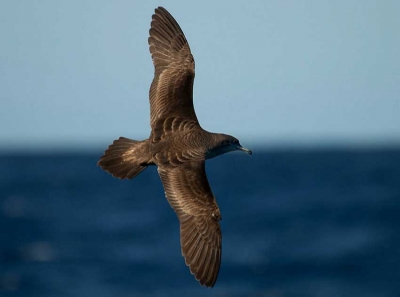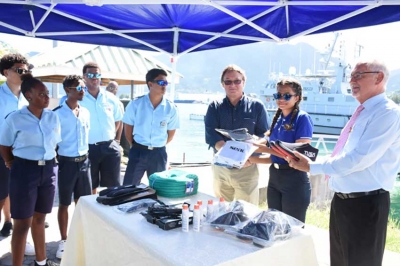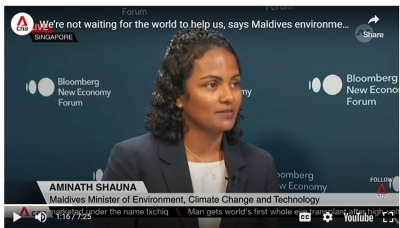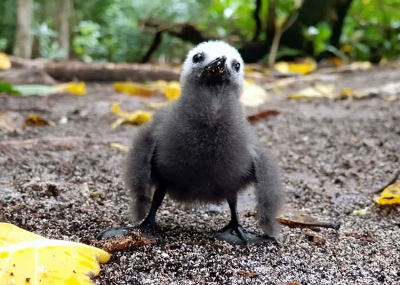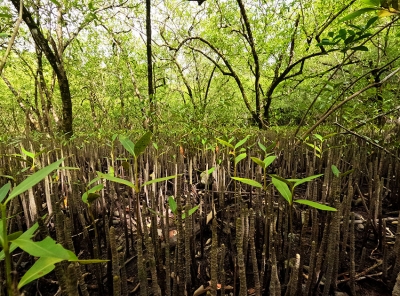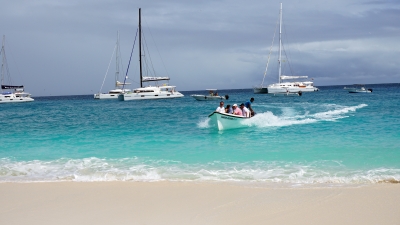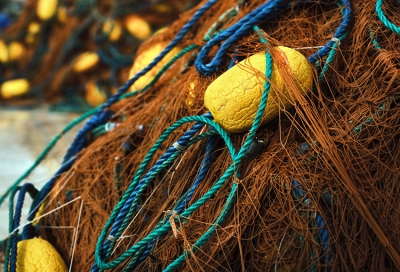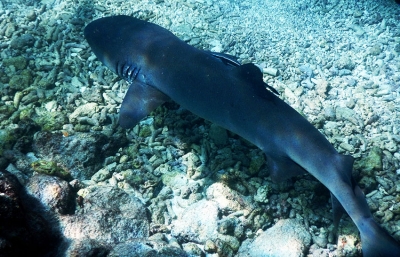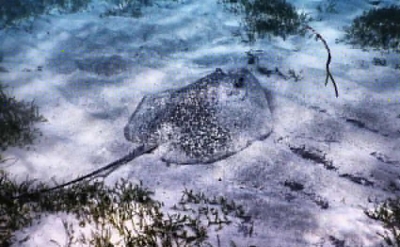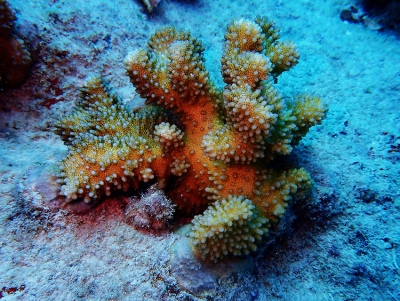
Super User
Research: Roaming seabirds need ocean-wide protection, research shows
Unlike other oceans, which are known to have specific “hotspots” where predators, including seabirds, gather in large numbers to feed, the Indian Ocean lacks such concentrated feeding areas, a recent paper has revealed. This lack of hotspots is particularly concerning given the various threats seabirds face due to human activities.
Saya de Malha leaves for its third dFAD clean-up expedition
(Seychelles Nation) The Saya de Malha vessel of the Seychelles Coast Guard (SCG) left Port Victoria yesterday afternoon for its third drifting Fishing Aggregate Devices (dFAD) expedition clean-up exercise in Seychelles territorial waters and shores of the outer islands.
Tired of failed climate promises by rich nations, tiny Maldives takes matters into its own hands
(channelnewsasia.com) Tired of unfulfilled climate promises by rich countries, the Maldives is implementing its own environmental protection strategies to stay above water, says its Minister of Environment, Climate Change and Technology Aminath Shauna.
Lesser noddys check into Cousin Island for the breeding season
It’s early morning on Cousin Island Special Reserve. You sit on the veranda of the field station, sipping coffee and scaring off Seychelles fodys and skinks determined to grab a piece of your breakfast. As you stare off into the sea, you notice a flock of Lesser Noddys (Anous tenuirostris) close to shore.
Sink or swim: Exploring the mangroves of Port Glaud
Known for their salt-tolerant trees and intricate root networks, mangroves thrive in harsh and ever-changing environments. They shelter unique flora and fauna. Their extensive roots stabilize coastlines, mitigate erosion, and protect us from storm surges. Besides being carbon sinks, they also purify water by filtering pollutants and trapping sediment and reduce flooding by absorbing excess rainwater.
Not a piece of cake – walking in the shoes of a Cousin Island warden
Rangers work tirelessly to safeguard our protected areas, wildlife, and ecosystems, often under demanding and challenging conditions. Cousin Island Special Reserve's rangers, known as wardens, don’t wear shoes but they are up to their ears in daily work.
Plastic pollution on the world’s coral reefs -Nature
A new paper says that both shallow and deep-water coral reefs, even in remote areas, are impacted by plastic. Most of the larger items are from fishing “ghost gear” such as nets. Food wrappers and plastic bottles were also common.
Plastic is an “emerging threat” to reefs which have already been stressed by the impacts of climate change, pollution, and overfishing.
The study examined 84 reefs at more than 25 locations including uninhabited atolls and reefs at depths of 150 metres across the Indian, Pacific, and Atlantic oceans.
Anthropogenic debris was found in 77 out of the 84 reefs surveyed, including in some of Earth’s most remote and near-pristine reefs, such as in uninhabited central Pacific atolls.
The Comores, which together with Mauritius, Seychelles, and Madagascar form part of the group of island states in the Western Indian Ocean, is the worst-affected location with nearly 84,500 items of plastic in each square kilometre.
Pinheiro, H.T., MacDonald, C., Santos, R.G. et al. Plastic pollution on the world’s coral reefs. Nature 619, 311–316 (2023). https://doi.org/10.1038/s41586-023-06113-5
Seychelles exported nearly 5 tonnes of shark fins from bycatch in 2022
(Seychelles News Agency) Seychelles exported 4,819.5 kg of shark fins in 2022 and most of the fins are generated in bycatch of semi-industrial fishing, said a top fisheries official.
Two thirds of reef sharks and rays risk extinction: study
(AFP) - Nearly two-thirds of the sharks and rays that live among the world's corals are threatened with extinction, according to new research published Tuesday, with a warning this could further imperil precious reefs.
Coral reefs, which harbour at least a quarter of all marine animals and plants, are gravely menaced by an array of human threats, including overfishing, pollution and climate change.
Shark and ray species -- from apex predators to filter feeders -- play an important role in these delicate ecosystems that "cannot be filled by other species", said Samantha Sherman, of Simon Fraser University in Canada and the wildlife group TRAFFIC International.
But they are under grave threat globally, according to the study in the journal Nature Communications, which assessed extinction vulnerability data from the International Union for Conservation of Nature (IUCN) to look at 134 species of sharks and rays linked to reefs.
The authors found 59 per cent of coral reef shark and ray species are threatened with extinction, an extinction risk almost double that of sharks and rays in general.
Among these, five shark species are listed as critically endangered, as well as nine ray species -- all so-called "rhino rays" that look more like sharks than stingrays.
- Keeping reefs healthier -
"It was a bit surprising just how high the threat level is for these species," Sherman told AFP.
"Many species that we thought of as common are declining at alarming rates and becoming more difficult to find in some places."
Sherman said the biggest threat to these species by far is overfishing.
Sharks are under most threat in the Western Atlantic and parts of the Indian Ocean, whereas the Indian Ocean and Southeast Asia are the highest risks for rays.
These regions are heavily fished and do not currently have management in place to reduce the impact on these species, said Sherman.
Last year countries at a Convention on International Trade in Endangered Species summit approved a plan to protect dozens of shark and ray species, adding 21 coral reef species in addition to the 18 species already covered by the regulations.
Sherman said this was "a step in the right direction", but added that a global effort was needed to improve implementation, while the regulations themselves do not stop these species being killed as "bycatch".
She added that the study showed greater risks to rays on coral reefs, but that they enjoy fewer protections.
"The solutions are similar for both sharks and rays -- limits on fishing, well placed and properly implemented Marine Protected Areas, and alternative livelihood solutions to reduce the number of fishers on coral reefs," Sherman said.
Coral reef fisheries directly support the livelihoods and food security of over half a billion people, but this crucial ecosystem is facing an existential threat by overexploitation and global heating.
Human-driven climate change has spurred mass coral bleaching as the world's oceans get warmer.
Modelling research has shown that even if the Paris climate goal of holding global warming to 1.5 degrees Celsius is reached, 99 percent of the world's coral reefs will not be able to recover.
At two degrees of warming, the number rose to 100 percent.
"We know coral reef health is declining, largely due to climate change, however, coral reef sharks and rays can help keep reefs healthier for longer," said Sherman.
The study was carried out by an international team of experts from universities, government and regional oceanic and fishery organisations as well as non-governmental organisations across the world.
© Agence France-Presse
Nature Seychelles outplanted 4,000 corals in Cousin Island Special Reserve in 2022
(Seychelles News Agency 16.1.23) In 2022, Nature Seychelles outplanted 4,000 coral fragments, grown in 4 underwater nurseries in the Cousin Island Special Reserve Marine Protected Area (MPA), according to the environmental NGO.
